Can CBD Oil Cause a Failed Drug Test?
With the increasing prominence of cannabidiol (CBD) as a natural remedy for various ailments, users may find themselves facing an unexpected hurdle: the question of whether cbd oil can show up on a drug test. While CBD itself doesn't register on typical screenings, the complication arises from the possible trace amounts of tetrahydrocannabinol (THC)—the highs-inducing counterpart found in cannabis plants—present in some CBD products. This has led to a pressing concern for many: can reliable consumption of CBD lead to a failed drug test, particularly one's employment could hang in the balance? Individuals from all walks of life considering cbd and drug testing should become well-versed with the subtleties involved in the relationship between CBD oil and potential drug test red flags.
This introductory section will explore the intricacies beneath these questions, diving into what scientific authorities say about the risk of using CBD and the measures one might take to safeguard against unintended positive results. By dissecting the evidence, you'll gain a clearer understanding of how to navigate the burgeoning world of CBD while staying abreast of employment-related drug testing protocols.
Key Takeaways
- Urine screenings check for THC, not CBD, suggesting other factors contribute to failed tests.
- Mislabeled CBD products could unknowingly contain enough THC to trigger a positive result.
- Frequent use of CBD oil, even with legal THC levels, could accumulate detectable metabolites.
- Drug test outcomes are influenced by the product source and its THC content.
- Consumer vigilance is crucial in verifying the authenticity of CBD products to prevent drug test failures.
- Consultations with healthcare professionals can offer guidance on safe CBD usage.
Understanding Drug Tests and CBD Detection
As the use of CBD oil has become increasingly common for its therapeutic benefits, concerns about CBD oil and drug screening have emerged, especially for those facing employment drug tests. To clarify the nexus between CBD oil and drug testing, one must understand how these tests work and what exactly they are looking for within the human body.
Typically, when individuals are subjected to a urine drug test for cannabis, the primary chemical of interest is not CBD, but rather its psychoactive cousin, THC. THC, or delta-9-tetrahydrocannabinol, is the component associated with the ‘high' from marijuana use and is the target of standard drug screenings.
The Basic Principles Behind Drug Testing for Cannabis
Screening procedures are designed to detect specific metabolites that indicate the presence of THC in the system. These metabolites are by-products of your body metabolizing THC, and their presence can suggest recent use of cannabis.
Differences Between THC and CBD in Screening Procedures
CBD, however, being non-psychoactive, is not typically screened for in drug tests. Despite this, the issue arises with CBD products, particularly those derived from hemp, which legally can contain up to 0.3% THC. This small percentage can accumulate over time with regular use of CBD oil and potentially result in a positive cbd oil urine drug test, putting employment at risk.
Occurrences of users failing drug tests due to the use of CBD oil are often attributed to mislabeled products that inadvertently contain more THC than the legal limit, or cross-contamination during production. With these points in mind, those considering CBD oil for its health benefits should be cautious and knowledgeable about product selection when concerned about cbd oil and employment drug test outcomes.
Deconstructing the Composition of CBD Oil
Unveiling the ingredients of CBD oil sheds light on the complexity behind its effects and the potential impact on drug test results. Understanding the composition is critical for consumers and professionals navigating the CBD landscape.
How Trace Amounts of THC May Be Present in CBD Products
CBD oil, often derived from hemp, stands on the brink of legality with up to 0.3% THC allowed by law. Despite being marketed as THC-free, the reality can be quite different. Frequent users of CBD oil might ponder, will cbd oil make you fail a drug test? The answer lies in the subtle presence of THC, which, while legally negligible, can accumulate over time and raise flags in drug screenings. As a primarily non-psychoactive substance, CBD's association with positive drug tests hinges on this THC content.
For those questioning whether cbd oil drug test false positive results are a possibility, the answer is grounded in the intricacies of THC contamination. Even trace amounts of THC, when consumed in large quantities or over an extended interval, can yield a deceptive positive result on a drug test. It's the THC you have to watch out for, not the CBD itself.
Impact of Mislabeling on CBD Oil and THC Content
Mislabeling is one of the industry's greatest oversights, potentially leading to higher than expected levels of THC in CBD products. Consumers aiming for CBD's therapeutic edge without psychoactive hurdles could inadvertently receive more than they bargained for. This issue is compounded by products categorized as ‘full-spectrum CBD oil,' which contain various cannabinoids, including permitted trace amounts of THC.
With only one FDA-approved CBD medication available, the majority of products remain unregulated, fostering a market rife with inconsistencies. For anyone carefully monitoring cbd oil and drug test results, the vagueness surrounding product labels poses a true conundrum. Ensuring the product's reliability is paramount as the presence of even small quantities of THC can influence drug screening outcomes.
When considering CBD oil in relation to drug tests, the consumer's vigilance plays a pivotal role. Mislabeling not only reframes the expectations from a CBD product but also places users in a precarious position regarding drug testing protocols. Clear labeling, trust in product ingredients, and understanding potential legal thresholds for THC become the guardians against false positives and unnecessary stress.
Can Trace Levels of THC in CBD Oil Result in a Positive Drug Test?
The perplexing issue of cbd oil drug test failures remains a topic of concern, particularly when trace levels of THC, the primary psychoactive component of cannabis, are involved. Although CBD is widely recognized for its therapeutic benefits, it may harbor insidious amounts of THC, which could potentially accumulate within the body's system. This seemingly minute detail garners significant importance in the realm of cbd oil and workplace drug testing, where the stakes involve not just health but also employment.
The legal threshold for THC content in CBD products is set at a maximum of 0.3%. Nonetheless, consistent or concentrated use of CBD could lead to THC accumulation in the body over time. This buildup may reach a point where THC metabolites become detectable in urine tests commissioned during drug screenings, precipitating a positive test result.
While users may meticulously choose products labeled as THC-free or those claiming to be manufactured from THC-lacking hemp plants, the veracity of these assertions is often compromised by mislabeling issues rampant within the industry. The resultant exposure to trace THC poses a risk for a false positive in drug testing scenarios. Below is a comprehensive table detailing how various CBD products and their respective THC levels can influence drug test outcomes.
| CBD Product Type | Labeled THC Content | Potential for Accumulation | Risk of Positive Drug Test |
|---|---|---|---|
| Isolate | 0% | Low | Minimal |
| Broad-Spectrum | 0% THC | Moderate | Low to Moderate |
| Full-Spectrum | <0.3% THC | High | Elevated |
| Mislabeled / Contaminated Products | Variable / Unknown | Unknown | High |
The likelihood of encountering a positive drug test result increases with the frequency and dosage of CBD oil consumption, making safeguard measures and product research all the more crucial for consumers. This becomes especially salient for individuals in professions that mandate regular drug screenings, thereby intertwining one's health choices with their career paths. In conclusion, THC presence in CBD oil, even at legal trace levels, can indeed become a catalyst for a positive drug test, a matter demanding attention and careful navigation by CBD users.
The Interplay Between THC and CBD: Risks of Cross-Contamination
Investigating the subtleties between CBD and THC unveils a critical concern over cross-contamination—a significant factor that can influence cbd oil and drug test results. Behind the purity of CBD oil lie the methods of its extraction and production, which not only define its therapeutic quality but also its legal compliance and inadvertent effects on drug testing.
Extraction Processes and Their Role in THC Contamination
It is no secret that extraction methods directly impact the purity of CBD oil. Critically, some techniques may be more prone to leaving residual THC in the final product. This holds particularly true for full-spectrum CBD products, which are lauded for their ‘entourage effect', yet often contain a multitude of cannabinoids, inclusive of THC. The caveat here lies in the potential accumulation of THC, posing risks for users concerned about a cbd oil drug test false positive.
Challenges with Current Product Regulation and Quality Assurance
In the burgeoning CBD market, regulations stipulate that THC content must not exceed 0.3%. However, the absence of stringent quality assurance and oversight allows significant discrepancies that may lead to cross-contamination. Coupled with mislabeling, consumers may find themselves inadvertently navigating a minefield of legal THC levels. These regulatory gaps critically underscore the chance of false positives, where even the most cautious users may find their cbd oil and drug test results yielding unexpected and undesirable outcomes.
With the ongoing debates and rising concerns, it is vital that consumers exercise due diligence. Understanding the nuances of CBD oil production and the integrity of product labeling will be instrumental in mitigating risks associated with cbd oil and workplace drug testing. As the industry evolves, calling for heightened regulation and transparent practices can pave the way for safer, more reliable CBD consumption.
CBD Oil Drug Test: Myth or Reality?
Entering the debate over CBD oil and drug tests, one pivotal query stands at the forefront: will cbd oil make you fail a drug test? This question has garnered widespread attention due to the surge in CBD oil's popularity and the high stakes involved in workplace and other professional testing protocols. While numerous consumers leverage CBD's health benefits, the overshadowing cbd oil drug test concerns present a pressing challenge, especially for those in industries with stringent drug use policies.
The contention is not with CBD itself—a non-intoxicating compound widely recognized for its potential to alleviate various health issues. The crux of the matter lies within the reality of THC contamination, as even purportedly pure CBD products might carry traces of THC, the psychoactive substance sought after in drug screenings. Such discrepancies call into question product labels' validity and, ultimately, users' trust.
Scrutiny intensifies when considering the legalities involved. Hemp-derived CBD products are permitted to contain up to 0.3% THC by law. However, persistent use or high doses of these products can potentially accumulate enough THC metabolites in the body to elicit a positive reading on a drug test—an outcome dreaded by many employees.
Investigating the dichotomy between CBD's legal status and drug test sensitivity reveals a complex landscape. The sheer prevalence of anecdotal evidence detailing unexpected job-threatening test results fuels the debate. Consequently, the question remains: Is the concern surrounding CBD oil and drug tests founded on substantial evidence, or does it stem from misinformation?
Distilling the reality from the myth requires not only an assessment of the biochemical relationship between CBD and THC but also an evaluation of the CBD market's regulatory framework. As this discussion unfolds, those navigating the precipitous terrain of CBD usage must proceed with caution and informed decision-making to mitigate the genuine risk of a positive drug test from CBD oil use.
How Much CBD Oil Could Trigger a Positive Drug Test?
Exploring the relationship between cbd oil and drug testing unearths a complex picture informed by many factors. The amount of CBD oil capable of triggering a positive cbd oil urine drug test is not fixed and varies based on individual physiology, consumption patterns, and the specific product used.
Commonly, drug tests are not searching for CBD, which is non-psychoactive, but for THC metabolites. As many CBD products may contain trace levels of THC, consistent usage can lead to accumulation in fat cells, where THC is stored before it is gradually metabolized by the body.
Doses of CBD oil that are seemingly innocuous, even when taken in strict adherence to recommended guidelines, may contribute to this build-up over time, particularly with daily, long-term use. The detectable thresholds are influenced by multiple individual-specific elements such as one's metabolism rate, body mass, and overall health, as well as the sensitivity of the drug test. Compliance with the federal limit of 0.3% THC content in CBD products does not automatically exempt a user from failing a drug screening due to these variables.
For illustration, consider a daily CBD oil user adhering to moderate dosing protocols:
| Frequency of Use | Estimated CBD Dose (per Day) | THC Content (%) | Days Until Potential Detection* |
|---|---|---|---|
| Daily | 20mg | <0.3% | 7-10 |
| Daily | 40mg | <0.3% | 10-15 |
| Daily | 60mg | <0.3% | 15-30 |
| Intermittent | 20mg | <0.3% | 1-7 |
Note: *These figures are estimations and can differ based on individual metabolism.
The stark absence of an absolute threshold for CBD oil leading to a positive drug test implies a cautionary approach for users. Particularly for those subjected to regular drug testing, understanding these dynamics and possibly considering a hiatus from CBD use in anticipation of such tests can be a vital preventative measure.
Ultimately, the prudent course for individuals concerned about cbd oil and drug testing is to thoroughly research products, understand dosing implications, and perhaps consider alternatives if impending drug screening is a concern. It's essential to acknowledge the evolving legal landscape and scientific understanding of cannabis products, remaining vigilant to how these changes may affect drug testing outcomes in the future.
Differentiating Hemp-derived from Cannabis-derived CBD Products
As cannabidiol (CBD) continues to capture public interest for its health benefits, it's increasingly vital to distinguish between hemp-derived and cannabis-derived CBD products. These variations play a crucial role in cbd oil and drug screening, with specific legal thresholds governing the acceptable levels of tetrahydrocannabinol (THC) in these products.
Legal Definitions and the 0.3% THC Rule
Legally, hemp-derived CBD must contain less than 0.3% THC. This threshold is entwined with cbd oil drug test concerns as even such negligible amounts can potentially turn drug tests positive, depending on an individual's usage pattern and the sensitivity of the test employed. The 0.3% rule is pivotal in categorizing a product as hemp-derived and thereby legally marketable in various regions, including across many states in the U.S.
Nonetheless, the seemingly minute percentage does not fully eliminate the risk of triggering a drug screening alarm. It underscores the importance for users to remain well-informed on the nuances of CBD products, particularly when they pertain to employment or legal matters where drug testing is a standard procedure.
The Varied Sources of CBD and Implications for Drug Tests
Understanding the source of the CBD is imperative for users who are concerned about drug test results. Products derived from industrial hemp typically adhere to the legal limit for THC content, whereas those sourced from other varieties of cannabis may contain higher THC levels, thus posing a greater risk for users facing drug tests. The muddled line between various cannabis sources is more than a trivial detail; it bears significant implications for consumers navigating the nexus of cbd oil and drug screening.
Below, a table further delineates these important distinctions, underscoring the legalities and potential drug test implications of different CBD products based on their derivation:
| Type of CBD Product | Derived From | Legal THC Content | Implications for Drug Tests |
|---|---|---|---|
| Hemp-Derived CBD | Industrial Hemp | Less than 0.3% | Lower risk, but not completely devoid of drug test concerns |
| Cannabis-Derived CBD | Marijuana or other Cannabis Varieties | Typically higher than 0.3% | Higher risk for failing a drug test |
| Broad-Spectrum CBD | Various Cannabis Sources | No detectable THC | Minimal risk, contingent on accurate labeling and testing |
| Full-Spectrum CBD | Various Cannabis Sources | Up to 0.3% | Possible accumulation of THC, increased risk |
With the significant factor being the actual THC content within a specific product, users must exercise diligence in ascertaining the legitimacy of the CBD products they choose. Hemp-derived products, while generally safer in terms of legal compliance and cbd oil drug test concerns, still require thorough vetting to ensure they fall within the necessary legal limits.
Ultimately, whether you are choosing hemp-derived or cannabis-derived CBD products, the emphasis is on personal responsibility. Knowledge of the source, understanding of the labeling, and acknowledgment of the legal context all become critical for those aiming to avoid complications during drug screenings.
Practical Guidance for CBD Users with Pending Drug Tests
With the ever-growing popularity of CBD oil for its therapeutic benefits, there is an increasing concern among users about its implications for drug testing—particularly for those with an upcoming employment-related screening. Navigating the complex landscape of cbd oil and drug testing requires not only an understanding of the substance's legal status but also an informed approach to product usage and selection.
Importance of Understanding CBD Product Labels
Understanding CBD product labels is critical for those hoping to pass a urine drug test. While many products advertise being THC-free or contain only trace amounts that comply with legal limits, the accuracy of these labels is not always guaranteed. For users worried about cbd oil and employment drug test results, recognizing and interpreting product labels can be a vital skill. Broad-spectrum CBD, CBD isolate products, and items claiming to have 0% THC might seem like safe options, but consumers should remain cautiously skeptical of these assertions.
Steps to Limit Risk of Failing a Drug Test Due to CBD
To mitigate the risk of a positive outcome in a cbd oil urine drug test, prospective users should consider taking several precautionary steps. Obtaining a Certificate of Analysis (COA), a detailed report by an accredited third-party lab, can confirm the levels of THC present in the product. COAs provide a layer of assurance, despite some concerns about their reliability. Moreover, purchasing CBD products from licensed dispensaries offers another level of safety, as these establishments are held to rigorous testing standards to maintain their licensing and avoid significant financial and legal repercussions.
Below are recommended actions CBD users can take in anticipation of drug testing:
- Seeking out broad-spectrum or CBD isolate products
- Thoroughly checking product labels for specific claims about THC content
- Obtaining and evaluating a COA for the product of choice
- Engaging with licensed dispensaries that adhere to higher product testing standards
Following these strategies may not provide an absolute guarantee against a positive drug test, but they do represent the most practical approach for those who choose to use CBD products while also navigating the requirements of drug screening in the workplace.
In essence, the importance of vigilance and education cannot be overstated for CBD users facing drug tests. Understanding the nuances of CBD product labeling and actively seeking verification of THC content are essential steps in reducing the possibility of an unwelcome surprise during a drug screening process.
Potential Legal and Employment Ramifications of Positive Drug Tests
The intersection of cbd oil and workplace drug testing raises important concerns about the legal and employment consequences of positive drug test results. For many employees, the presence of THC – even in minute, legal quantities within CBD products – could have dramatic impacts on their professional lives. Navigating this complex scenario requires an understanding of both the sensitivities of drug tests and the intricacies of CBD oil's THC content.
Often, individuals who utilize CBD oil for its health benefits may be unaware of the potential for failing a drug test, which can occur due to varying levels of THC present in certain CBD products. A positive result can lead to job termination or jeopardize future employment opportunities. Such an outcome not only disrupts one's career but could also have broader, lasting financial and personal repercussions.
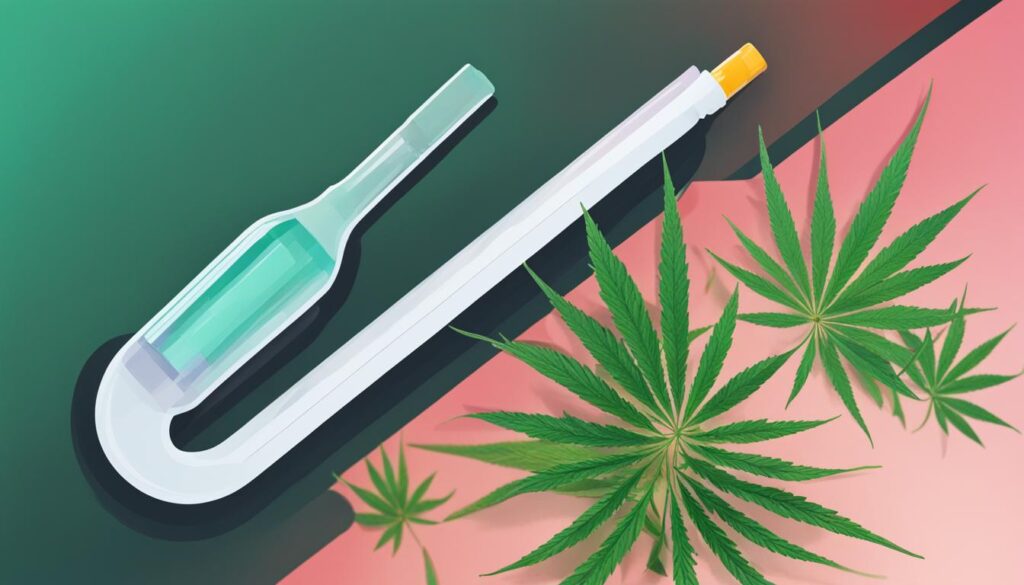
For those in legal or parole situations, or living in states where newborn screening for THC is practiced, the stakes are even higher. Testing positive for THC because of CBD product use could have serious legal implications, compounding already sensitive circumstances. Here, the importance of carefully selecting CBD products and understanding their THC content becomes not just a matter of personal preference, but of legal necessity.
To illustrate these serious cbd oil drug test concerns, consider the following scenarios with the potential outcomes of a positive drug test:
| Scenario | Possible Consequences |
|---|---|
| Employee Drug Testing | Termination of employment, difficulty in securing future jobs |
| Legal/Parole Situations | Revocation of parole, legal sanctions |
| State Newborn THC Screening | Potential legal action, implications for custody |
| Workers' Comp Claims | Denied claims due to presumed impairment |
As the cannabis industry grows and CBD products become more mainstream, it's crucial for consumers to remain vigilant about the composition and labeling of the products they consume. Inaccurate labels and the lack of regulation can lead to unexpected cbd oil drug test concerns, where individuals may inadvertently consume more THC than they intended. Such occurrences highlight the need for comprehensive education and exacting scrutiny when it comes to CBD consumption for individuals subject to drug testing.
Ultimately, the responsibility lies with users to understand not only the wellness benefits of CBD oil but also its potential to affect drug screening outcomes and the subsequent legal and employment-related ramifications. With careful consideration and informed decision-making, CBD users can better navigate the risks associated with cbd oil and workplace drug testing.
Expert Recommendations on Using CBD Oil Safely
Amidst the surging popularity of CBD oil comes the need to use this wellness product with a sense of assurance, particularly when concerning cbd oil and drug screening. To that end, experts in the field share their insights and recommendations to help users sidestep potential pitfalls when interacting with drug tests.
Industry Insights on CBD Consumption and Drug Testing
While cannabidiol itself does not show up on standard drug tests, the potential for products to contain THC, even in minuscule amounts, can lead to positive results for cannabis screens. Proficient voices in this industry often emphasize the pivotal distinction between CBD and THC, encouraging consumers to be especially conscientious if an imminent cbd oil and drug test is a concern. In response to apprehensions about cbd oil and drug test results, vigilant selection of THC-free or broad-spectrum CBD products is highlighted as a prudent choice.
How to Navigate the Market for CBD Products with Greater Assurance
In the quest for CBD products that offer peace of mind, experts underscore the importance of transparency and verification. They recommend seeking out reputable companies that provide a thorough Certificate of Analysis conducted by third-party laboratories. The presence of BBB accreditation is another hallmark of a company committed to quality and reliability, aspects that are crucial when evaluating the risk associated with cbd oil and drug screening. Consumers are advised to consult healthcare professionals for personalized advice, particularly to assess any risks in relation to workplace drug testing policies. This engagement with industry standards and professional medical counsel can steer consumers away from questionable products and towards a safer use of CBD oil.
Analyzing the Impact of Long-term CBD Use on Drug Testing
Understanding the connection between long-term CBD use and drug testing has become a critical issue for employees and employers alike. With more individuals turning to CBD oil for its health benefits, concerns about how continued consumption may affect employment drug tests are on the rise. This analysis sheds light on the underlying processes and potential risks involved in regular CBD use and its impact on urine drug tests.
When it comes to cbd oil and employment drug test concerns, THC metabolites represent the linchpin. These compounds, created when the body processes THC, can linger for an extended period, particularly in fat tissues. Regular intake of CBD products that contain even trace amounts of THC might result in the buildup of these metabolites, subsequently increasing the risk of a positive result on a cbd oil urine drug test.
Various factors influence the risk associated with cbd oil and drug screening. Dosage amount, frequency of use, and individual metabolic rates all play a crucial role. The following table provides insight into how these factors might affect drug test results.
| Factor | Description | Impact on Drug Testing |
|---|---|---|
| Dosage of CBD | The quantity of CBD oil consumed each time. | Higher dosages increase the risk of THC metabolite accumulation. |
| Frequency of Use | How regularly CBD oil is used. | Frequent use can lead to a persistent presence of THC in the system. |
| Individual Metabolism | The rate at which an individual's body processes substances. | Slower metabolism may prolong the presence of THC metabolites. |
It's evident that responsible, informed use of CBD oil is vital for those subject to drug testing. Identification of products with lab-verified THC levels and awareness of how personal consumption patterns might interact with these levels could be key in preventing unwanted test results. With the stakes of cbd oil drug test failures being potentially high, such as job loss or disciplinary action, CBD users have to weigh their options and make educated decisions.
An effective way to manage these risks is through moderation and careful monitoring of CBD product intake. Consumers should aim for products labeled as ‘THC-free' or ‘broad-spectrum', and ensure that they come with clear, accessible lab results. While complete abstinence from CBD use is the only surefire way to avoid testing positive for THC, these steps can help mitigate risks for those who rely on CBD oil for their health and well-being.
The CBD User’s Checklist Before a Drug Screening
As the therapeutic use of CBD oil grows, so does the apprehension regarding cbd oil and drug testing. The burgeoning concern centers on cbd oil drug test concerns, primarily due to the potential presence of THC in products labeled as pure CBD. Consumers aiming to avoid a positive drug test must navigate a checklist of precautions and informed choices to ensure they remain clear of legal and professional repercussions. This preemptive strategy is particularly crucial for individuals in roles subject to mandatory drug screening.
Conducting due diligence starts with acknowledging the relationship between CBD products and drug screening protocols. Individuals must carefully evaluate their personal situation, including the possibility of work-related drug tests and accidental exposure to THC—be it through secondhand smoke or shared vaping devices. This introspection aids in assessing the level of risk entailed by their CBD use.
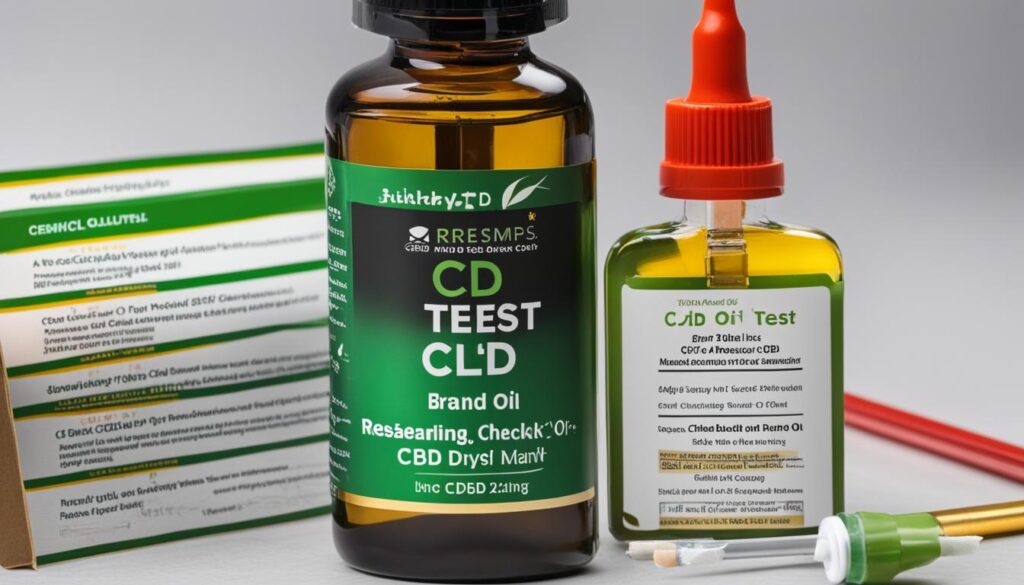
Thorough product sourcing is another vital part of the due diligence process. Savvy consumers scrutinize CBD product labels, searching for terminology indicating the nature of the CBD extract—with terms like “full-spectrum” suggesting the inclusion of other cannabinoids, and “THC-free” indicating no detectable amounts of THC. It is essential to know that “full-spectrum” products are more likely to contain trace amounts of THC that could potentially lead to a positive drug test.
Determining the proximity of CBD usage to the timing of the drug test is an often overlooked but critical consideration. As THC metabolites can linger in the body, moderating or ceasing CBD intake in the weeks leading up to a drug test might be necessary.
Seeking products that come with a detailed analysis of CBD to THC ratios can provide greater confidence in their use. Consumers are encouraged to directly engage with manufacturers for additional insights into their processing and testing methods. Such an approach helps to ascertain the likelihood of the presence of THC and prevent undesired outcomes.
| Pre-Screening Action | Purpose | Benefit |
|---|---|---|
| Assess personal risk factors | Identify potential sources of THC exposure | Reduces chances of accidental THC ingestion |
| Analyze CBD product labels | Determine extract type and THC content | Ensures product choice aligns with drug testing requirements |
| Consider timing of CBD use and drug test | Prevent accumulation of THC metabolites | Decreases probability of a positive drug test |
| Communicate with product manufacturers | Obtain processing and testing details | Provides transparency and builds trust in product quality |
Following the above checklist doesn't guarantee a THC-free drug test result, but it heightens awareness and promotes responsible usage. Users concerned about cbd oil and drug testing, especially those with cbd oil drug test concerns, can empower themselves through careful planning and continuous education on the topic.
The Science Behind CBD Oil and Drug Test Results
Delving into the pharmacological aspects of CBD and THC unveils a labyrinth of metabolic pathways that hold the key to understanding cbd oil drug test outcomes. Extensive research sheds light on why and how the non-psychoactive cannabinoid CBD is implicated in the controversial instances of positive drug tests, which can carry significant repercussions in the realm of cbd oil and workplace drug testing.
Physiology of CBD, THC, and Their Metabolic Pathways
The complexity of how CBD and THC are processed within the body stands at the core of drug testing debates. As THC enters the system, it is metabolized into compounds that are detectable in drug screenings, distinguishing them from the metabolites of CBD. These THC metabolites can be stored in fat cells for extended periods, affecting the longevity of their potential detection in a drug test.
Contrary to THC, CBD is metabolized differently, resulting in distinct compounds that typically fall outside the scope of standard drug testing. Nonetheless, the proximity of CBD to THC in terms of source and structure raises the specter of cross-contamination, which inadvertently may lend THC's detectable signature to a cbd oil drug test. For those concerned about cbd oil and workplace drug testing, understanding this biological interaction is crucial.
Investigating Case Studies and Clinical Research Findings
Clinical research and individual case studies have provided empirical evidence regarding the variability in THC content among CBD products. Instances have been recorded where consumers, confident in their use of CBD-only products, faced unexpected positive drug test results. Subsequent analysis revealed THC concentrations surpassing the legal threshold meant for hemp-derived products, casting a spotlight on the critical discrepancies in product quality and labeling.
These revelations propound the need for meticulous research into CBD's pharmacokinetics and call for more regulated product quality. For individuals navigating the job market or facing regular employment drug testing, these studies serve as a stark reminder of the exigency for transparency within the CBD industry, and the importance of verified, trustworthy sources.
Given the intricacies surrounding cbd oil drug test dynamics and the impact on cbd oil and workplace drug testing policies, it is evident that public awareness and scientific literacy regarding CBD and THC's metabolism are indispensable. Arming oneself with knowledge becomes the armor against the unintended consequences in professional spheres, where the implications of a positive drug test are far-reaching.
Conclusion
Embarking on the use of cannabidiol (CBD) oil requires a thorough understanding of its potential impacts on drug testing. Despite its recognized therapeutic benefits, the shadow of drug test discrepancies looms, marked by instances of cbd oil drug test false positive results. This phenomenon underscores the pivotal importance of due diligence in product selection and a proactive approach to understanding the substance's relationship with drug screening protocols. The assurance that one will not fail a drug test due to CBD usage relies on vigilant research and verification.
A Balanced View on CBD Oil and Its Implications for Drug Testing
Striking a balance between the health benefits of CBD oil and the complexities of drug testing protocols calls for a measured perspective. While CBD oil, by itself, should not lead to a drug test failure, the lurking presence of THC due to contamination raises legitimate concerns. Will CBD oil make you fail a drug test? This question lingers amid reports of discrepancies, prompting consumers to navigate the marketplace with heightened caution and precision to avoid unintentional entanglements with THC.
Final Thoughts on CBD Use, Caution, and Drug Screening Policies
In summary, the discourse on CBD oil and its inadvertent ties to drug test failures pivots on the need for informed consumer practices and more stringent industry standards. The call for transparency and rigorous third-party testing is not just a demand for product quality but a safeguard against the adverse repercussions of failing a drug test due to THC contamination. Until such time as regulatory measures and testing protocols evolve, the mantra for CBD users remains one of cautious engagement and educated choice making to preemptively guard against the possibility of a cbd oil drug test false positive.
FAQ
Can CBD Oil Cause a Failed Drug Test?
CBD oil itself typically does not cause a failed drug test. However, some CBD products may contain trace amounts of THC, which could potentially result in a positive drug test. As drug tests typically screen for THC or its metabolites, it is crucial to use products that are accurately labeled and have been third-party tested for THC content to minimize this risk.
What Are the Basic Principles Behind Drug Testing for Cannabis?
Drug tests for cannabis primarily look for the presence of THC or its metabolites in the system. These tests do not typically screen for CBD. There are various types of drug tests, such as urine, blood, saliva, and hair follicle tests, with urine tests being the most common in employment settings. The presence of THC metabolites above a certain threshold indicates a positive result.
What Are the Differences Between THC and CBD in Screening Procedures?
THC is the psychoactive compound in cannabis that most drug tests are designed to detect, mainly because of its mind-altering effects. CBD, or cannabidiol, is a non-psychoactive compound and is generally not targeted in a drug test. Nonetheless, since both compounds can be present in the same plant, cross-contamination is possible, complicating the differentiation between the two during screening procedures.
How Trace Amounts of THC May Be Present in CBD Products?
Trace amounts of THC may be present in CBD products due to the hemp plant's natural composition or cross-contamination during the extraction and production processes. Legally, hemp-derived CBD products can contain up to 0.3% THC, but inaccurate labeling or poor quality control can result in higher levels of THC that might trigger a positive drug test.
What is the Impact of Mislabeling on CBD Oil and THC Content?
Mislabeling can lead to consumers unknowingly ingesting more THC than intended, potentially causing a positive drug test. Without proper regulation and stringent quality control, products advertised as containing no THC could still contain enough to cause a failed drug test, leading to the risk of a false positive.
Can Trace Levels of THC in CBD Oil Result in a Positive Drug Test?
Yes, if a CBD oil contains enough THC, even in trace amounts, it could potentially result in a positive drug test, especially with frequent use or high doses. This is because THC can accumulate in the body over time, leading to detectable levels.
How do Extraction Processes Play a Role in THC Contamination?
The method of extracting CBD from cannabis plants can affect the purity of the final product. Some extraction techniques may not be able to completely isolate CBD from other cannabinoids, including THC, which can lead to trace amounts of THC in the final product and increase the risk of a positive drug test.
What are the Challenges with Current Product Regulation and Quality Assurance?
The current lack of regulation in the CBD market creates inconsistencies in product quality and content. Without mandatory comprehensive testing and quality assurance measures, products may contain more THC than indicated on labels, leading to false positives in drug tests.
How Much CBD Oil Could Trigger a Positive Drug Test?
There is no definitive answer to the amount of CBD oil that could trigger a positive drug test because this depends on various factors including the person's metabolism, frequency and size of doses, and the specific product's THC content. However, even small amounts of THC, if used regularly, can accumulate in the body over time.
How Do Legal Definitions and the 0.3% THC Rule Affect Drug Tests?
The 0.3% THC rule is a legal threshold distinguishing hemp from marijuana. Hemp-derived CBD products are legal federally if they contain less than 0.3% THC. However, even these small amounts may potentially lead to a positive drug test, depending on individual usage patterns.
What’s the Difference Between Hemp-derived and Cannabis-derived CBD Products?
Hemp-derived CBD products legally must contain less than 0.3% THC, while cannabis-derived CBD products may have higher levels of THC. This distinction is essential for drug tests as products with higher THC levels are more likely to result in a positive test.
How Can CBD Users with Pending Drug Tests Limit Their Risk of Failing?
Users can limit their risk by choosing high-quality, third-party tested, THC-free products, or abstaining from CBD product usage before a drug test. Paying close attention to product labels, obtaining Certificates of Analysis, and opting for CBD isolate or broad-spectrum products without THC can also reduce the risk.
What Are the Potential Legal and Employment Ramifications of Positive Drug Tests?
Failing a drug test can lead to severe consequences, including termination of employment, loss of job opportunities, legal repercussions, and challenges within parole or custody arrangements. It is important for individuals to understand these potential outcomes when using CBD products that may contain THC.
What Tips Do Experts Give for Using CBD Oil Safely?
Experts advise purchasing CBD oil from reputable sources that provide third-party lab testing results. They also recommend choosing products labeled as THC-free or made with CBD isolate, considering dosage and frequency of use, and consulting with healthcare professionals if there are concerns about drug testing.
How Does Long-term CBD Use Affect Drug Testing?
Prolonged and consistent use of CBD, especially products that contain trace levels of THC, can lead to the accumulation of THC metabolites in the body. This could increase the duration that THC remains detectable in urine, leading to an increased risk of testing positive during drug screening.
What Should CBD Users Consider Before a Drug Screening?
Before a drug screening, CBD users should assess their risk of exposure to THC, understand product labels, and consider the timing of their last CBD use relative to the test. It is also advisable to discuss the use of CBD products with the testing facility or employer and to consider legal implications based on the state in which they reside.
What Does Science Say About CBD Oil and Drug Test Results?
Scientific research has indicated that while CBD is not the target of drug tests, the presence of THC in some CBD products can result in positive test results. Studies highlight the need for more consistent and reliable product standards and labeling in the CBD industry.
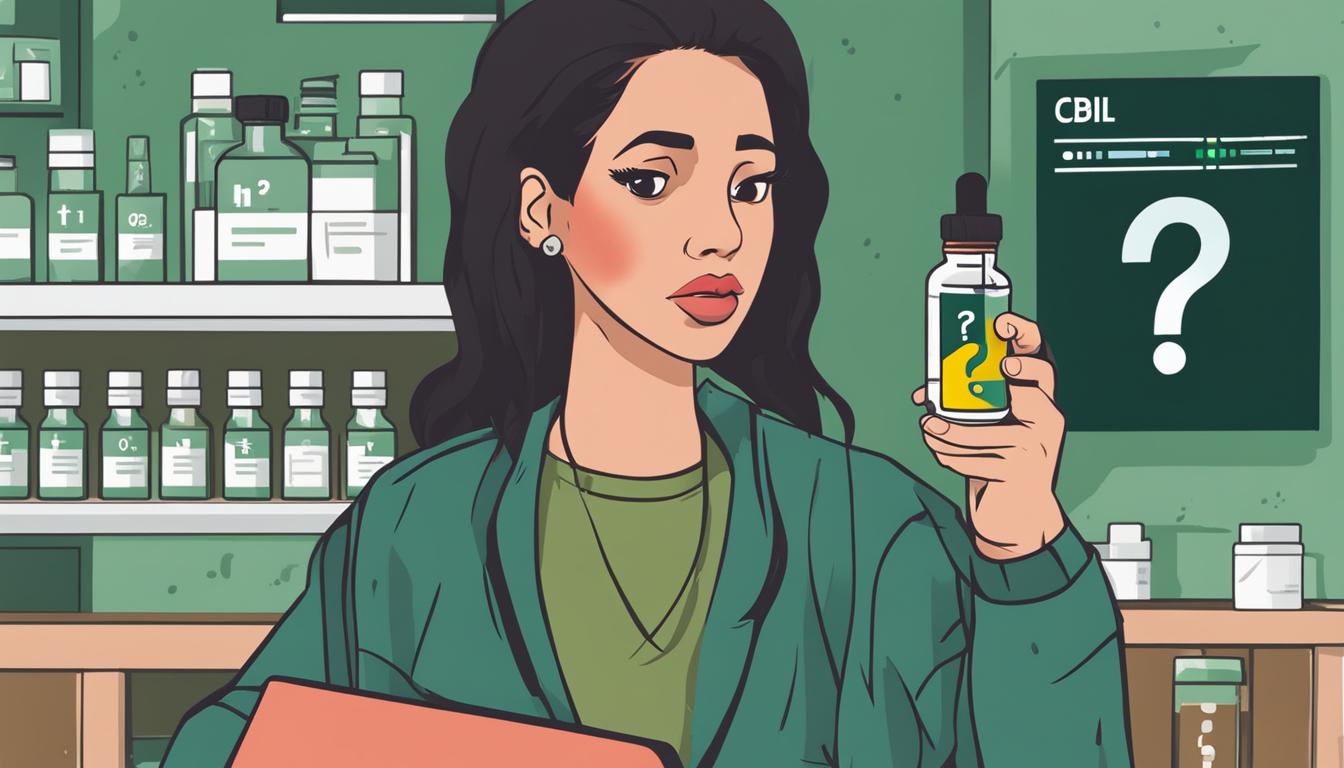



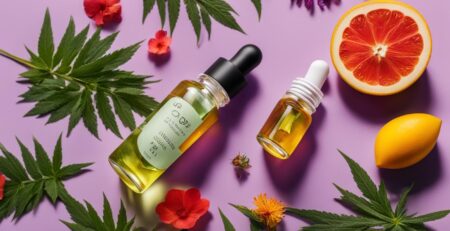



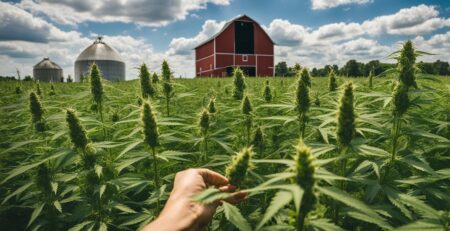
Leave a Reply